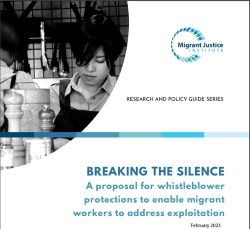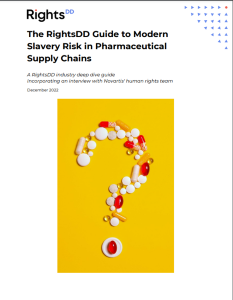 Breaking the Silence:
Breaking the Silence:
A proposal for whistleblower protections to enable migrant workers to address exploitation February 2023
ACAN (Australian Catholic Anti-slavery Network) adds its voice to calls to better protect people on temporary visas who experience exploitation in Australia. These protections would increase the opportunity for international students and the many thousands of temporary workers in Catholic operations and supply chains to seek help without fear of losing their visa.
Download: pdf BREAKING THE SILENCE A Proposal for whistleblower protections (1.86 MB)
National Roundtable with Attorney General
Catholics attend event to mark milestone in fight against modern slavery.
ACAN (Australian Catholic Anti-slavery Network) program manager Jenny Stanger was invited to share a reflection as a civil society member of the National Roundtable on People Trafficking and Slavery and advocate for legal reforms. The event was convened by Attorney-General Mark Dreyfus to mark the 10th anniversary of royal assent of modern slavery offences in Australia’s criminal code. The Crimes Legislation Amendment (Slavery, Slavery-like Conditions and People Trafficking) Act included inserting forced marriage, forced labour, deceptive recruiting, and organ trafficking offences in the Criminal Code Act 1995.
The legislation also amended existing definitions to capture a range of slavery-like exploitative practices and forms of coercion. In December, Attorney General Dreyfus announced a targeted review of the modern slavery offences. To date, only 31 people have been convicted of modern slavery crimes in Australia.
“The Criminal Code has hardly been tested in court and there has never been a prosecution related to forced labour in the supply chains of a business. There will be little effect to the Review if the Migration Act, also under review, does not address key barriers to people on temporary visas or those without a visa reporting exploitation and abuse. This would also increase confidence Modern Slavery Act reporting entities to report modern slavery concerns to authorities without fear that it will result in deportation of people with legitimate grievances that should be remedied."
Read the full article |Cath News
 Risk Alert:
Risk Alert:
Modern slavery and pharmaceuticals
The pharmaceutical supply chain is one of the most complex of any industry. It extends into many different sectors, including waste management, clinical trials, transportation and distribution, site operations, security services, travel, and recruitment agencies. Rights DD has produced a report on the risks of modern slavery in the production of pharmaceuticals. The report outline risks to people in raw materials, primary and secondary manufacturing, marketing and distribution, ancillary products and services and in relation to human trials for development of drugs.
The report includes an interview with the Novartis Human Rights Team about their approach, actions and role in the Pharmaceutical Supply Chain Initiative (PSCI), again, demonstrating the importance of sector collaboration.
Read: The RightsDD Guide to Modern Slavery Risk in Pharmaceutical Supply Chains












